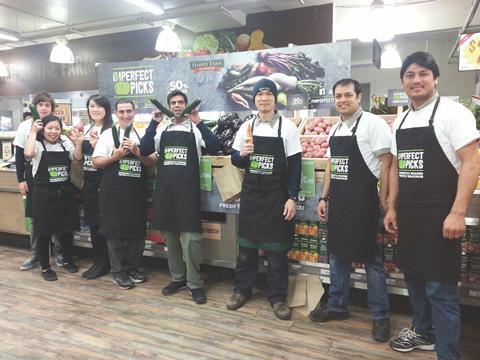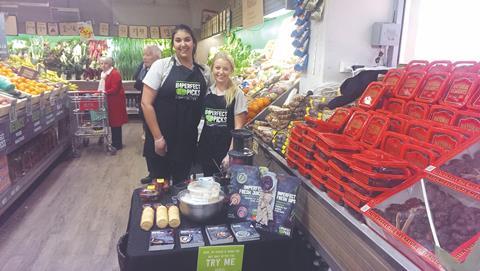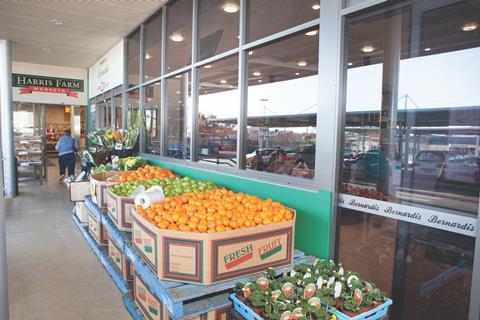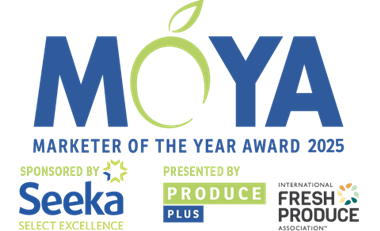Innovative concepts such as its store-within-store model and Imperfect Picks campaign are helping the wholesaler-retailer to extend its reach.

What happens to the 20-25 per cent of a grower’s crop that does not meet the aesthetic specifications set by most retailers? It’s long been a problem for growers universally, and it helps to explain why as much as a quarter of fresh fruit and vegetable production goes to waste in Australia. Blemished, discoloured or misshapen produce is often deemed ‘unmarketable’, and dumped or ploughed back into the field.
Providing a whole-of-crop marketing solution to Australian growers is a mantra for many fresh produce marketers, but Harris Farm Markets has taken it to a new level with its Imperfect Picks campaign.
Launched three months ago, the initiative promotes fruit and vegetables that have visual defects – be it size, shape or blemish – but are still nutritious and delicious. Or, in Harris Farm’s words, “might not look perfect from the outside but are as perfect as ever on the inside”.
Inspired by a highly successful European campaign from French retailer Intermarché to promote ‘Inglorious Fruits’, Imperfect Picks has been enthusiastically embraced in Australia by both growers and consumers, according to Harris Farm Markets’ Tony Mahoney.
“We’ve been working very hard with growers to try and offer value for every one of them that wants to grow quality fresh produce, and that’s where our Imperfect Picks campaign came in,” he explains.
“We went direct to farmers with the concept and the response was overwhelmingly positive. They were so grateful to have an outlet for good-tasting produce that didn’t look good.”
While the Imperfect Picks range is priced at a significant discount to so-called ‘perfect-looking’ product, Mahoney says that prices are agreed with the grower before product is supplied. “The discipline is that the farmer must get a return that covers the cost of packing and distribution, then a margin for their farming inputs,” says Mahoney. “The retailer then has a reduced margin as well, and the Imperfect supply chain is complete, yielding value for the grower, retailer and customer.”
Mahoney says the Imperfect Picks range is capped at eight items per week. “We look for the staple lines, such as carrots and potatoes, then seasonal specials, such as mangoes where there is a great opportunity for smaller or scarred fruit,” he says, adding that the programme has already achieved excellent results with crops affected by climatic setbacks.

At a consumer level, Mahoney says the response has been very positive across its stores, with shoppers embracing the concept for different reasons. “In our upmarket stores in places like Bondi Beach and Potts Point we’ve noticed that customers love this concept because they believe they’re doing something to cut food wastage and benefit the environment by purchasing Imperfect Picks,” he says.
“In our country stores, customers love it because they see it as helping the growers on the land, while in suburban stores in areas such as Penrith shoppers have latched onto it as a way of securing value items to feed their families.”
As well as supplying its own 22 stores with the Imperfect Picks range, Harris Farm offers another sales.channel via its wholesale division, which gives food service customers a value-option to support growers.
Indeed, Imperfect Picks is one of a range of market options that Harris Farm offers its grower-suppliers.
“In addition to Imperfect Picks, our website wholesale range includes premium fruit sold loose as a store offer, premium product sold by the carton at significant price reductions, and now a catering range targeted at the cafés and restaurants,” says Mahoney.
Harris Farm also recently launched an export division to add another dimension to its supply chain. “It’s all about giving growers the opportunity to move their whole crop with next to no wastage.”
Back on the retail front, Harris Farm is working to expand its footprint through a novel store-within-store business model. The first incarnation of the concept came through a tie-up with the Bernardi family, who operate an IGA store in Bathurst. Harris Farm, which had a long-standing trading relationship with the Bernardi family, took on the management of the store’s fresh produce section under the Harris Farm Markets brand.

More recently, Harris Farm has set up a similar arrangement for an IGA store in Moruya on the New South Wales south-coast. “This group of IGA owners – the Tomlec Group – has seven IGA stores – and we currently manage the buying and supplying for their stores,” says Mahoney. “We’re now extending this to operate the Harris Farm ‘store within a store’ not only with the Tomlec group in their Moruya store, but potentially more in-store produce departments.”
GA stores make up the majority of the 70 retail outlets Harris Farm supplies beyond its own network.
“What we’ve learned from the Bathurst IGA is that the focus on the fresh produce offer through Harris Farm’s format and supply arrangements has increased not only the produce business in-store, but also the overall trading business,” he notes. “We share the cost of one set of overheads, rather than operating two stand alone stores, while the customers get a really good retail offer.”
Harris Farm has also received enquiries about the store-within-store concept from another high-profile retailer. While Mahoney cannot divulge their identity, he says he is excited by the opportunity it presents to expand the Harris Farm brand into other states beyond New South Wales.
Harris Farm is equipped with the particular set of skills required to make the store-within-store concept work, he adds. “You need to have your supply side and logistics well-organised, and you need to have a skilled set of retail employees specialised in produce,” he details. “Harris Farm has a fresh buying team and our policy is ‘pick-to-zero’; we buy to order each day and distribute to those stores the same day using a mix of farm-direct and market procurement. Our team walks the market everyday and only buys fresh stock that day – it’s an approach driven not so much by price, but by quality and taste.”
Mahoney says a clear message from its customers is that they want a “fresh food shopping experience when they go to buy their groceries”.
“That’s what we strive to provide, and we can only achieve it with the support and innovation of our growers and suppliers.”
